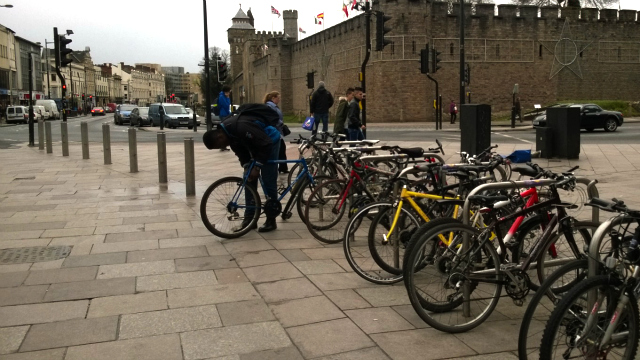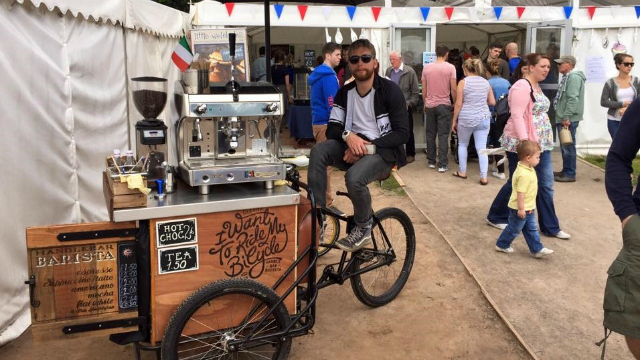Businesses on bikes are booming in Cardiff as young cyclists with an eye for innovation and entrepreneurship use social media to pedal their way to clients.

“I want to ride my bicycle, I want to ride it where I like!”
For Cardiff cycling lovers with an eye for innovation, the famous Queen lyrics are more than good music. They’re inspiration and used to show their passion for bicycles can be used to start up unconventional businesses on wheels.
Look at HandleBar Barista, the travelling coffee shop that operates by pedal-power and a desire to boost cycling in the Welsh capital. The owners discovered owning a business could be just like riding a bike, during a trip to Copenhagen: “We saw a bike ‘rolling around’ selling coffee and thought ‘wouldn’t that be an amazing business and promote cycling back home? Cardiff has the potential to be a green cycling city and we want to set the example,” says co-founder Chris Garrett.

Besides pedalling and selling fresh coffee, the business depends on the Internet to work. “Social networks are brilliant for free promotion. We find it useful for our customers to know exactly where we are serving coffee,” says Chris.
This intelligent way to connect to clients got its fame from Uber, the international company that developed a smartphone application for people to easily find and book drivers that use their own cars. The modern ‘share-economy’ model allows consumers and suppliers to find each other digitally.
While Uber’s possible arrival in Cardiff is controversial because taxi drivers fear losing their jobs, Handlebar Barista’s similar online strategy works well. Like Uber, it uses the Web to get directly to clients with ‘house-calls’. “It is not uncommon for someone to tweet us asking for ’emergency coffee’. We then head to their place ASAP and serve them their hot drink fix,” says Chris.
But the coffee shop does not have the monopoly for Cardiff’s business on bikes and is only one of many following the ‘Green Uber sharing-economy’ trend.
Another bicycle start-up uses Twitter to offer domestic housework. “We come on a bike to clean your house and your bike if you need it,” says Jenny Malone, the head of Clean & Sprocket’s. As an environment lover looking for work, the ‘Green Uberfication’ movement is perfect. “Clean & Sprocket came from the need to be self-employed, living with an active sustainable lifestyle, and my insatiable desire to ride bicycles,” explains Jenny.
There’s also Cardiff Cycle Couriers which promise not to harm the environment as they pedal fast to deliver urgent documents, and smaller businesses like Penylan Pantry that cash in with additional services to deliver fresh fruit by bike.

“In Cardiff there is a growing community of bicycle enthusiasts who offer support across social media,” sums up Clean & Sprocket’s owner. Choosing cycling over driving reduces the city’s carbon footprint and saves up to 67p per mile, which adds to £14 million a year for Cardiff.
The Welsh people are surely becoming aware of the benefits with 78% demanding more investment in cycling according to data from the 2015 UK Bike Life survey.
The future:
The next step in bike businesses’ seems to be smartphones. “A mobile app and vastly expanded business is definitely the long-term goal,” says Jenny Malone who hopes to see her ‘house cleaning on demand’ bicycles operating simultaneously in homes beyond city borders.
Chris Garret agrees. “At HandleBar Barista we definitely want an app in the future. People can track us for coffee on the go!” says the young entrepreneur who mentions Deliveroo, the online food delivery company, as a successful example of a start-up that uses an app to coordinate a team of take-away cyclists.
But Cardiff Start’s co-founder Neil Cocker warns this might be small services’ downfall: “The ‘Uber sharing-economy’ model is great, but it does not need an app. There is an idea that everyone has to get one, but some services don’t. Do clients use the Internet? Is the business big? If not, an app is pointless. Social media is enough.”
Neil says Cardiff’s cycling boom is fantastic, but advises founders to focus on promoting better riding conditions: “More cycling lanes are needed. We are still not a bicycle city like Amsterdam. There are far too many pot holes around the city.”
Movements to improve cycling in the Welsh capital like Cardiff Cycle City identify other problems. “Besides the Taff Trail and the route over the barrage most infrastructures have a low standard and there is no route from the east into the city centre,” says spokesperson Gwenda Owen who accuses Cardiff of lacking cycling routes that meet the Active Travel Act, which should provide more paths for cycling and walking.
But Gwenda still believes cycling start-ups have potential: “If more people recognise the benefits bikes can bring to economic growth there is a strong argument for the City Council to raise investment.”
For now, bicycle businesses will continue to use social media to shift the workplace in Cardiff to create a greener, pedalling friendly, city. As Chris Garret gets on his bike to get Cardiff people their coffee he boldly states, “Cardiff can lead the way in ‘cycling over driving.’”
Discover more: Curious stories about Cardiff’s Businesses on Bikes – Nice customers
HandleBar Barista Extra – Learn More about the Bike Café

